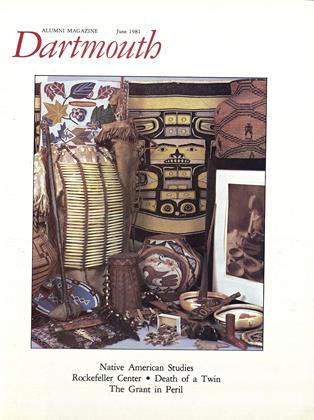Three years ago, English Professor James Epperson dropped his bombshell on the College's fraternity system. Fraternities were criticized for public rowdiness, the slovenly condition of their houses, and what Epperson termed "drunkenness, arrogance, intolerance of people with different values, and the willingness to humiliate defenseless people they stand against everything the College teaches." Epperson, now deceased, petitioned the faculty to discuss abolishing the fraternities, and in November of 1978, by a surprising margin of 67-16, the faculty voted in favor of abolition. Not quite willing to take that drastic measure, the Board of Trustees placed the fraternities on probation for one. year.
Most observers feel that the fraternities have made strides toward improvement since Epperson condemned the system. The Fraternity Board of Overseers, in its annual report to the trustees this spring, said: "It is the F.8.0.'s collective opinion that the past 12 months have been a time of progress for the fraternity system. The critics are fewer, the contributions more numerous and obvious, the untoward inqcidents considerably fewer, and the resolve of the fraternity system (through the Interfraternity Council) to be a positive force are clear steps forward."
The fraternities are said to be in sound financial condition as a group, and they have invested hundreds of thousands of dollars in major renovations or additions to their physical facilities and minor exterior cosmetic improvements, including painting and landscaping. "The buildings have come a long way. They may not be as good as they were 50 years ago, but they're a lot better than they were ten years ago," says James Coakley '67, the College's assistant business manager who oversees the fraternities' building and money problems.
"Progress is a subjective term, and you'll get varying reactions depending on whom you talk with, but I think the fraternities are headed in the proper direction," says Joseph Zolner, the dean with direct responsibility for fraternities. "My sense is that the fraternities have improved. I think there has been an increased awareness of the issues such as coeducation, alcohol, house physical facilities, and conduct. I sense a greater awareness for the need for responsibility and accountability and a very genuine responsiveness to the issues." Zolner points out that the College Committee on Alcohol Concerns, which includes significant fraternity representation, has been active in providing counseling and in urging reduced consumption of alcohol. "The program has heightened the awareness of alcohol use," observed Zolner.
Fraternities and sororities have also undertaken a number of service projects. Members of the Beta Theta Pi house, for example, offered to do spring cleaning chores during a weekend in May to earn funds to send four or five Upper Valley youngsters to summer camp. The houses sponsor booths to raise money for a specific charity during the Summer Carnival. A Casino Night recently brought in more than $500 for the Upper Valley Training Center. Other efforts include the Big Brother/Big Sister program, visits to a local nursing home, Thanksgiving canned food drives, recycling projects, and participation in the March of Dimes walk-a-thon.
There are currently 22 fraternities and three sororities on the Dartmouth campus. Five of the fraternities are coeducational. "The annual rush process completed on April 4 augurs well for the system," the fraternity overseers reported to the trustees. "The total number of reported fraternal pledges at 472 was the highest in recent memory, and the five coeducational fraternities and three sororities all had successful rushes."
"The fraternities have made some pretty strong strides in recent years," says Robert G. Murphy Jr. '65, chairman of the fraternity overseers. "It's one of those things where you gain a lot from adversity. I really think they've come a long way."
 View Full Issue
View Full Issue
More From This Issue
-
 Feature
FeatureDeath and Reunion: the loss of a twin
June 1981 By George L. Engel -
 Cover Story
Cover StoryThe Long-Deferred Promise
June 1981 By Shelby Grantham -
 Feature
FeatureRockefeller Center: the ideal of reflection and action
June 1981 By Donald McNemar -
 Feature
FeatureA Dull Little Bug Imperils the College Grant
June 1981 By Ted Winterer -
 Article
ArticleDartmouth Authors
June 1981 -
 Article
ArticleThe National Committee
June 1981
Article
-
 Article
ArticleTHE HONORABLE DAVID CROSS, LL. D.
October, 1908 -
 Article
ArticleStiff Physical Program
August 1942 -
 Article
ArticleTop Club Secretary
DECEMBER 1970 -
 Article
ArticleEducating educators: A promising new plan
NOVEMBER • 1985 -
 Article
ArticleA Two-for-One- Convocation and the Med School's 200th
NOVEMBER 1996 By E. Wheelock -
 Article
ArticleFreshman Sports
March 1960 By RAY BUCK '52

